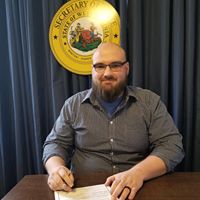John Isner graduated last year from West Virginia Law School. He plans on taking the West Virginia bar exam next month. He’s teaching political science part time at Shepherd University.

John Isner
Now Isner has decided to run for the West Virginia House of Delegates from District 59.
The district — which covers parts of Berkeley and Morgan County — is currently represented by Republican Saira Blair.
Blair announced last week that she will not seek re-election.
Instead, she’s going to graduate school.
Only one other candidate is in the race so far — Republican Larry Kump.
Isner is a native of Parkersburg, West Virginia. He moved to the eastern panhandle to attend Shepherd University as an undergraduate, where he studied political science.
Isner describes himself as a centrist Democrat.
Isner says his two primary issues will be getting on top of the opioid epidemic and stopping the brain drain out of West Virginia.
On the opioid epidemic, Isner says “it’s not going to be an easy thing to solve.”
“It’s not 100 percent solvable,” he says. “We have to stop playing along party lines and start saving people’s lives.”
On the brain drain, Isner said — “there has been a lot of focus on creating jobs, but we don’t focus on creating careers.”
“We have a major brain drain. We need good, smart professionals.”
How would West Virginia stop the brain drain?
“West Virginia is stuck in this weird transition,” Isner said. “We’re not surviving off the tourism. We’re not surviving off coal mining. We have to start looking at what we can do to make the state money, make the people money.”
When asked whether he has heard of the TransCanada natural gas pipeline that is planned to cut under the Potomac River to bring fracked natural gas into West Virginia, Isner said he first heard of it about a year ago.
But Isner said he wouldn’t weigh in for or against the pipeline until he gets a chance to study it.
But he said all types of energy — coal, natural gas, all fossil fuels and alternatives — should be on the table.
When asked whether he would support legislation, similar to federal legislation that would phase out fossil fuels by the year 2035 — legislation that is supported this year by more than 100 candidates for Congress — Isner said he wouldn’t.
“I don’t think this is best for West Virginia because of the economic implications it would have on the state,” Isner said.
